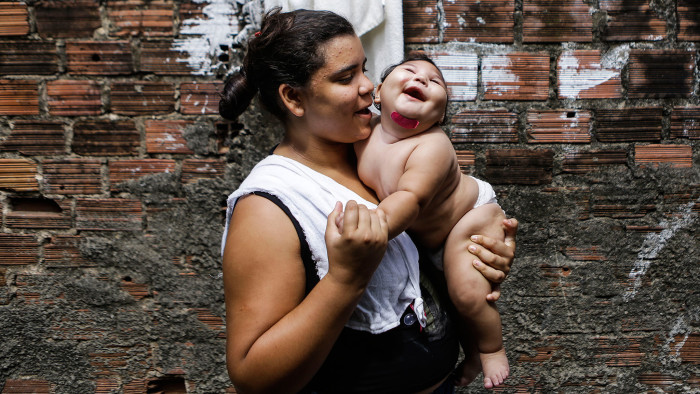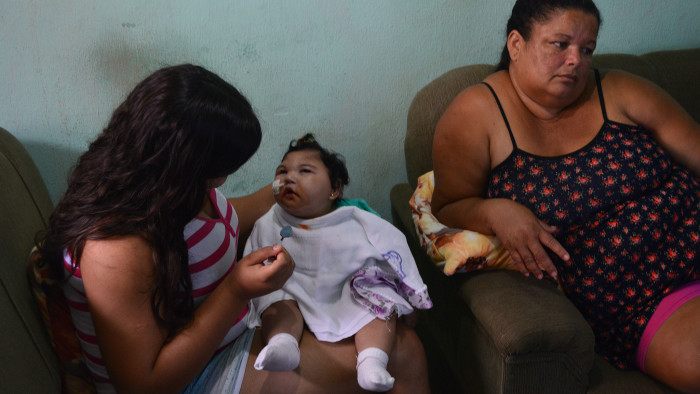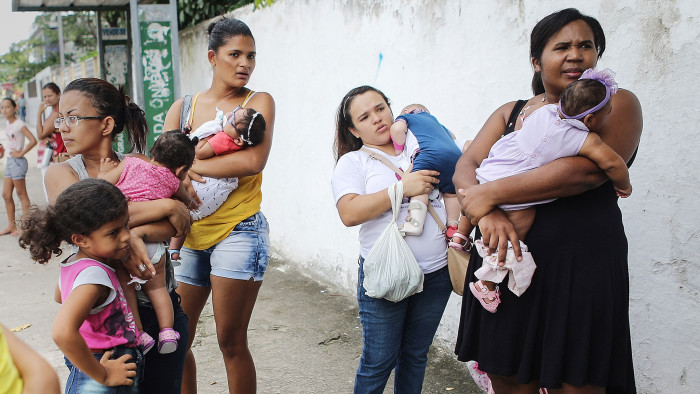Health workers prepare for second surge of Zika-related birth defects

Roula Khalaf, Editor of the FT, selects her favourite stories in this weekly newsletter.
On November 12 2015, at a hospital in Brazil’s north-eastern city of Recife, Maria Eduarda was about to be born. Her mother lived on the street and wanted nothing to do with the baby — she had already had seven children and had abandoned them all. Her father was an alcoholic and incapable of looking after himself, but he had a sister, Miriam, who had agreed to care for the child.
Miriam Pereira and her 18-year-old daughter-in-law, Cleane Stefani, were at the hospital, waiting to collect the little girl. They had already settled on the name.
It was not until after Maria Eduarda had been delivered that Stefani and Pereira realised just how difficult her life — and theirs — would become. Doctors measured the circumference of her head. At 26cm it was about 6cm less than the minimum for a healthy child, signalling a severe case of the birth defect microcephaly.
“We have no idea if she’ll ever walk or even talk,” says Stefani, as she cradles the 11-month-old baby in her arms in the family’s cramped, makeshift home in a favela by a highway in Olinda, on the outskirts of Recife. The two women do have an idea of what caused the birth defect, however: Maria Eduarda’s mother caught the mosquito-borne Zika virus about three months into her pregnancy, according to Stefani.

As well as needing a tube to ingest liquids, Maria Eduarda has difficulty breathing and moving, and has several seizures a day. She is one of an estimated 2,000 babies in Brazil born over the past year with microcephaly — a congenital condition where the baby’s brain does not develop correctly during gestation, leading to an abnormally small head. Mounting evidence over recent months has shown that the Zika virus is at least partly responsible for nearly all of the recent cases of what is otherwise a rare condition.
While researchers develop a vaccine against the virus, which is not expected to become widely available in Brazil for another couple of years, scientists are struggling to understand Zika’s mysterious effects. Infections have been reported in 72 countries since 2007, according to the World Health Organisation, yet the number of cases of microcephaly linked to the disease has been much higher in Brazil than in other Zika-hit countries such as neighbouring Colombia.
While researchers are investigating factors other than Zika that may be behind the sharp rise in microcephaly in Brazil, they are also looking into other possible effects of Zika on pregnant mothers and babies. Tânia Saad, a neurologist at the Fernandes Figueira National Institute for the Health of Women, Children and Adolescents in Rio de Janeiro, says the children of mothers infected with Zika who did not develop microcephaly have nevertheless shown some degree of neurological damage. “Often they show signs of being hyperexcited, with some difficulty or lack of co-ordination when it comes to breastfeeding or feeding themselves,” she says.

Health workers now fear a possible second surge of microcephaly in southern cities such as São Paulo over the coming hot summer months. While researchers believe many women in Brazil’s north-east will already have been infected with Zika by now, thus gaining immunity to the virus, São Paulo’s expectant mothers may be more vulnerable, having not been exposed to the disease before falling pregnant.
“The trend is that the biggest outbreaks will occur in states where there have so far only been a few cases,” says Pedro Vasconcelos, director of the Evandro Chagas public health institute in the northern state of Pará. “Meanwhile, in those states that have already been badly affected, there are likely to be [no new] Zika infections or only a small number of cases.”
Such forecasts are little comfort to Stefani and Pereira, or to the thousands of families having to care for a child with microcephaly. Stefani, who dropped out of school when Maria Eduarda was born, looks after the baby during the day, while Pereira, who has had to quit her cleaning job, takes the “night shift”, she explains.
Almost every day, the women have to catch two buses to attend seemingly endless hospital appointments in Recife, often returning late at night, they say. Apart from a small government disability allowance, Stefani and Pereira rely on the money that Stefani’s husband — Pereira’s son — earns fitting car radios.
The biggest expense is lactose-free milk powder, Stefani says, pointing to a tin that costs R$120 ($38), equivalent to about 15 per cent of the monthly minimum wage. Maria Eduarda needs a couple of tins a week, Stefani says. “The government is meant to give that to us for free, but for the past three months they haven’t had any available,” she explains over the noise of a popular soap opera blaring from the television in the living room.
Zika has had a devastating effect on Brazil’s poorer communities. The mosquitoes that transmit the virus thrive in the stagnant water abundant in favelas such as the one where Stefani and Pereira live, which lack adequate plumbing and sanitation. The outbreak has also come just as unemployment is surging during Brazil’s recession and government health budgets are under tremendous strain.
Similarly, the Ebola outbreak that began at the end of 2013 also hit Africa’s poorest communities the hardest. Megan Lees-McCowan, head of programmes in west Africa for Street Child, a UK charity, estimates that 12,000 children lost one or both caregivers to the virus. “Orphaned children found themselves leading the household; teenage girls became pregnant as they exchanged sex for food to survive; and poverty increased for already poor families who found themselves caring for the additional children of deceased relatives,” she says.
Outbreaks such as Zika and Ebola should serve as a reminder for governments that it makes more financial sense to research the effects of mosquito-borne diseases before they cause widespread and expensive health crises, says Vasconcelos. “We need to be quicker and better at researching lesser-known infectious agents before they cause epidemics,” he says.
Back in Olinda, Stefani doubts she will have time to finish her studies or go to work as Maria Eduarda grows up. While Pereira will officially adopt the child, Stefani cares for the baby girl as if she were her own. “I didn’t really know what I wanted to do as a job anyway,” Stefani says. “Now it doesn’t matter.”
Comments